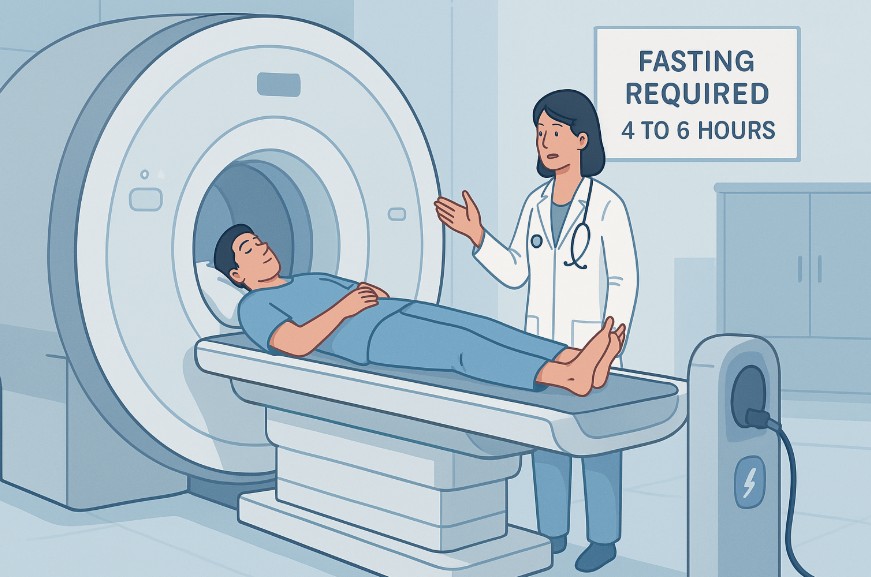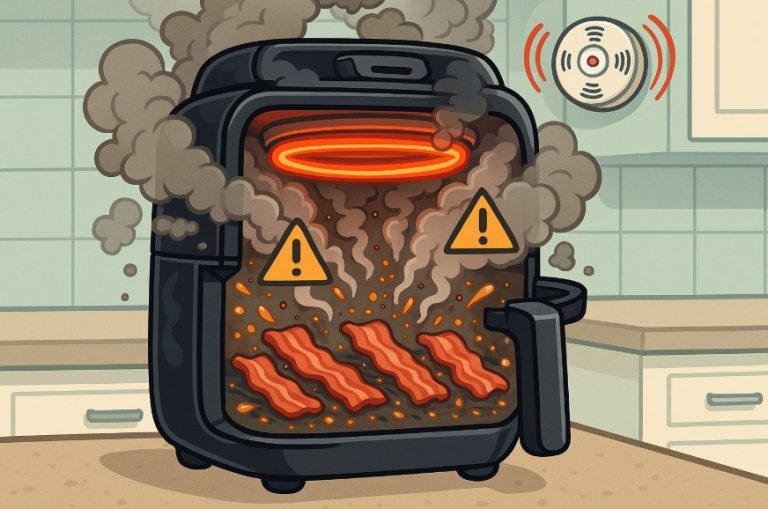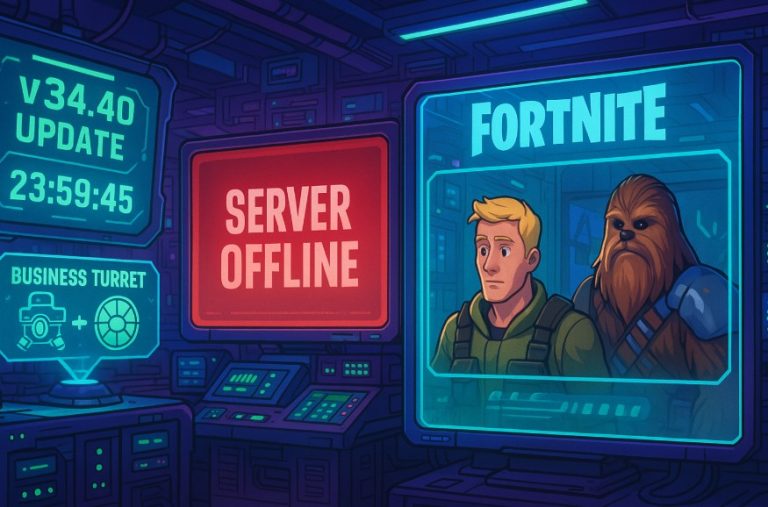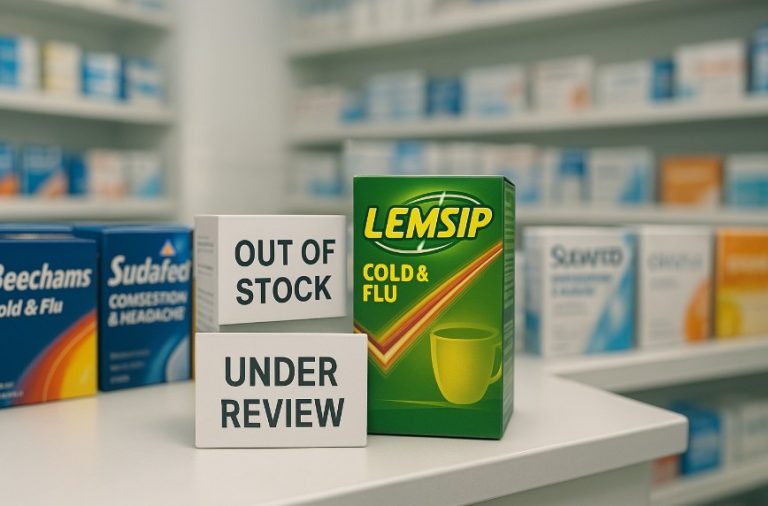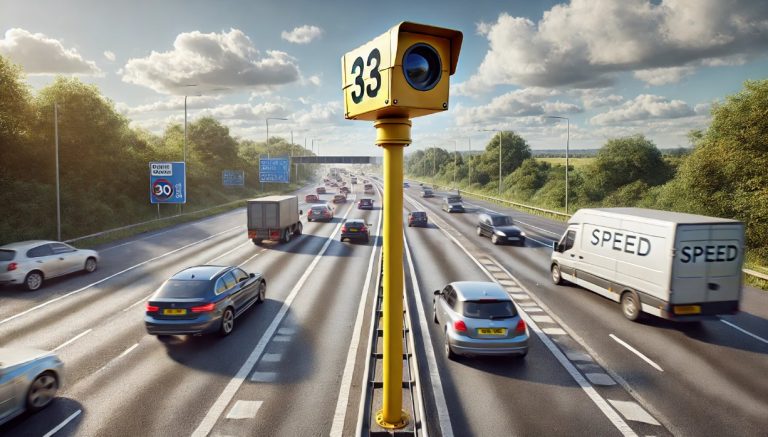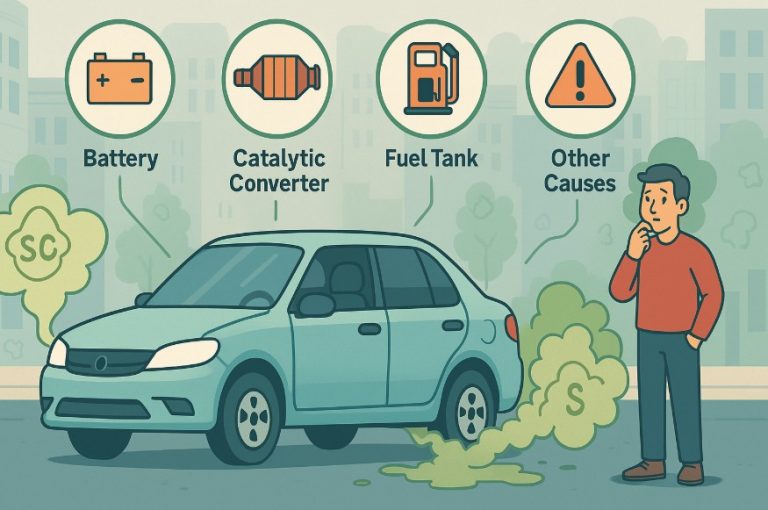Why Do You Have to Fast Before MRI with Contrast?
Undergoing a medical scan can be a daunting experience, especially when you’re handed a list of instructions, including the requirement to fast. For many patients in the UK, this question arises: Why do you have to fast before an MRI with contrast? Is it simply a precaution, or is there a valid medical reason behind it?
In this comprehensive guide, we delve into the science, safety considerations, and best practices surrounding fasting before an MRI scan that involves contrast dye.
What Is an MRI with Contrast and Why Is It Used?
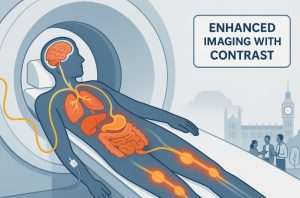
Magnetic Resonance Imaging (MRI) is a non-invasive diagnostic test that uses a magnetic field and radio waves to produce detailed images of the body’s internal structures. When enhanced with a contrast agent most commonly gadolinium-based dye, the MRI becomes even more powerful in detecting abnormalities.
What is an MRI with contrast?
An MRI with contrast involves administering a dye into your vein, typically through an intravenous (IV) line. This dye travels through the bloodstream and highlights areas of the body that are more difficult to see on standard MRI scans, such as inflamed tissues, blood vessels, and certain tumours.
It’s commonly used to assess:
- Brain and spinal cord conditions
- Tumour growth or spread
- Inflammatory diseases like multiple sclerosis
- Blood flow in organs or tissues
How contrast dye enhances imaging accuracy?
The gadolinium contrast material alters the local magnetic field in the body, increasing the visibility of certain tissues or blood vessels. This enhanced detail allows radiologists to differentiate between normal and abnormal tissue more effectively.
Without the use of contrast, early-stage diseases or subtle abnormalities might go unnoticed.
Why Is Fasting Required Before an MRI Scan?

Fasting isn’t required for all types of MRI scans, but it becomes essential when contrast dye is involved or when the scan targets the digestive region. But why?
How food affects the imaging process?
Food in the digestive tract especially the stomach or intestines can interfere with image clarity. During digestion, these organs expand, contract, and shift position. This movement can create motion artefacts or shadows on the scan, reducing the accuracy of the diagnostic results.
For example, if you are undergoing an MRI of the liver, pancreas, or bowel, the presence of food can obscure vital anatomical details.
Contrast dye and digestive interference
Contrast dye enhances visibility in areas where abnormalities may lie. If the gastrointestinal system is actively digesting food, the dye’s effectiveness may be diminished due to movement and chemical interference. In some cases, the contrast material may also cause mild gastrointestinal discomfort, which is exacerbated if food is present.
Additionally, food contents may obscure vascular details or other subtle signs radiologists are looking for potentially delaying diagnosis or misrepresenting clinical findings.
What Are the Medical Reasons for Fasting Before an MRI with Contrast?
Beyond improving image quality, fasting before an MRI with contrast has direct implications for patient safety.
Reducing risk of aspiration under sedation

In rare cases, particularly with claustrophobic patients, children, or individuals with anxiety, sedation may be required. If a sedative is used and the stomach contains food, the patient is at risk of aspiration, where vomit is inhaled into the lungs. This can cause a serious complication known as aspiration pneumonia, which is potentially life-threatening.
Fasting reduces this risk significantly and is a common safety protocol for any procedure involving sedation or anaesthesia.
Enhancing visibility of abdominal and pelvic areas
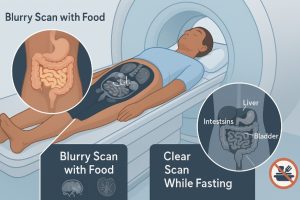
MRI scans of the abdomen or pelvis are more accurate when the stomach and bowel are empty. Fasting reduces bowel movement and gas, which can cause distortions in the MRI images. Clear imaging is crucial for detecting diseases of the gastrointestinal tract, such as Crohn’s disease, liver conditions, or tumours in the pancreas.
Avoiding nausea and adverse reactions

Although rare, contrast agents can cause side effects such as nausea, dizziness, or mild allergic reactions. These symptoms may worsen if the patient has recently eaten, leading to vomiting during the scan, a situation that can interrupt the procedure and cause discomfort.
What Are the Fasting Guidelines for MRI Scans in the UK?
The NHS and private imaging centres in the UK typically provide tailored fasting instructions based on the area being scanned and whether contrast dye is being used.
How long to fast before an MRI with contrast?
In most cases, patients are advised to fast for 4 to 6 hours before their appointment. This includes avoiding solid foods and, in some cases, certain drinks.
However, the exact fasting duration may vary based on individual medical history, the body part being examined, and the healthcare provider’s policy.
What you can drink before the scan?
Generally, clear fluids are allowed up to 2 hours before your MRI. These may include:
- Still water
- Black tea or coffee (without milk or sugar)
- Clear isotonic drinks (only if advised)
Avoid any creamy or sugary drinks, carbonated beverages, or alcohol, as these can affect the scan.
Special considerations for diabetic patients
Patients with diabetes require special guidance, especially if they are on insulin or oral hypoglycaemic medications. Fasting can lower blood sugar levels dangerously, so radiology departments usually provide adjusted fasting protocols, allowing for small snacks or drinks with medication.
It’s crucial to discuss your diabetes management with your medical team prior to the scan.
What Happens If You Don’t Fast Before an MRI with Contrast?
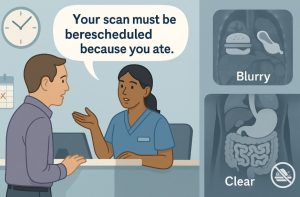
While it may seem like a minor oversight, not fasting can result in complications or delays.
Possible delays or scan rescheduling
If a patient has not fasted as instructed, the radiology team may have to cancel or reschedule the scan to ensure accurate results and safety, particularly if sedation is involved.
This can cause:
- Delayed diagnosis
- Increased stress for the patient
- Longer wait times for appointments
Compromised scan results
Food in the stomach or intestines may affect image clarity, particularly in abdominal or pelvic scans. This could result in missed diagnoses, requiring repeat imaging and unnecessary exposure to additional contrast dye.
What Do NHS Guidelines Say About Eating Before an MRI?
NHS policies on eating and drinking before MRI
NHS trusts across the UK typically recommend:
- No food for at least 4 hours before scans involving contrast
- Clear fluids allowed up to 2 hours before
- Patients to continue taking regular medications unless advised otherwise
These are general guidelines and may be adjusted for specific procedures or patient needs.
How private and public healthcare instructions differ?
Private imaging centres often offer more personalised preparation plans, depending on your scan type and medical history. While they generally follow similar fasting rules, you might receive more detailed written or verbal instructions, especially if your case is complex or urgent.
How Should You Prepare for an MRI Scan in the UK?
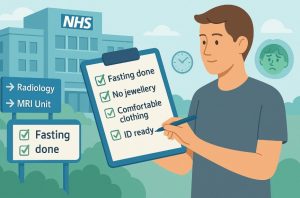
Proper preparation makes the scanning process smoother and helps you feel more comfortable.
Questions to ask your radiologist
- Is fasting required for my scan?
- Can I take my medication as normal?
- Will I receive contrast dye?
- Do I need someone to accompany me?
What to bring and wear on the day of the scan?
Wear loose, metal-free clothing. Leave jewellery, piercings, or watches at home. Bring your:
- NHS appointment letter or referral slip
- ID or hospital number
- List of medications (especially for diabetic or cardiac patients)
Arriving 15–30 minutes early is also advised to allow time for any preparation or consent procedures.
Why Is Fasting Important for MRI Accuracy and Safety?
Summary of key fasting rules
Fasting plays a pivotal role in ensuring clear imaging and minimising health risks. Key points include:
- Fast for 4 to 6 hours before your MRI with contrast unless told otherwise
- Clear fluids are usually permitted up to 2 hours beforehand
- Always follow specific guidance from your healthcare provider
Why following instructions matters?
Failure to follow fasting guidelines doesn’t just inconvenience healthcare professionals, it could delay your diagnosis and compromise your care. Being informed and compliant helps radiologists obtain the most accurate results possible.
How Do Fasting Requirements Differ by MRI Type?
| Type of MRI Scan | Contrast Used | Fasting Required | Fasting Duration |
| Brain MRI | Often | Sometimes | 0–4 hours |
| Abdomen MRI | Yes | Yes | 4–6 hours |
| Pelvis MRI | Yes | Yes | 4–6 hours |
| Spine MRI | Occasionally | Rarely | 0–2 hours |
| Cardiac MRI | Yes | Yes | 4 hours |
This table provides a general guideline. Always consult your provider for personalised instructions.
What Should You Remember About Fasting Before an MRI with Contrast?
In summary, fasting before an MRI with contrast isn’t merely a formality it’s an essential part of the diagnostic process. From improving image clarity to protecting you from potential complications, fasting ensures that both your health and the scan quality are prioritised.
Whether your appointment is through the NHS or a private provider, always read your instructions carefully, ask questions, and prepare ahead of time. Your results and potentially your health depend on it.
FAQs
Can I drink water before an MRI with contrast?
Yes. Water is generally allowed up to 2 hours before the scan unless told otherwise.
Is fasting necessary for all MRI scans?
No. Fasting is mainly required for abdominal, pelvic, or contrast-enhanced MRIs.
What happens if I eat before my MRI?
Your scan might be rescheduled or produce unclear images, leading to delays.
How does contrast dye work in an MRI?
It highlights blood vessels and tissues, allowing radiologists to detect abnormalities more easily.
Can I take medication before an MRI with contrast?
Yes, but always confirm with your radiology team, especially if you’re diabetic or on blood thinners.
Is fasting the same across all UK hospitals?
Not exactly. NHS trusts may vary slightly in their policies. Always follow your appointment letter’s instructions.
Can children be fasted for an MRI scan?
Yes, but fasting guidelines for children are usually shorter and depend on whether sedation is needed.

